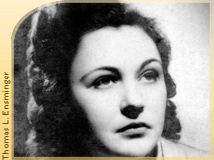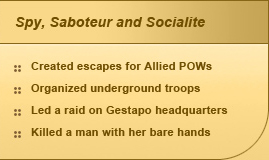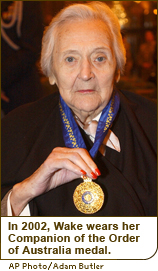

I hate wars and violence, but if they come then I don’t see why we women should just wave our men a proud goodbye and then knit them balaclavas.
—Nancy Wake
A socialite-journalist from Australia was hardly the most likely candidate to become the Allies’ most decorated servicewoman in World War II, but that’s just what Nancy Wake did. She was a formidable threat to the Nazi regime, operating as a top-notch secret agent for the French Resistance. Nicknamed the White Mouse for her uncanny ability to elude capture, Wake headed a group of guerilla Resistance fighters and served as a courier for an escape network of British soldiers and refugees. By age 31, the superb saboteur topped the Gestapo’s most-wanted list and had a five-million-franc (roughly US$100,000) price tag on her head.
The Exuberant Expat
Wake was born in New Zealand and grew up in Australia, the youngest of six children. She was a rebellious child and ran away twice. At 20 she left home for good, traveling by boat to New York, then London and finally arriving in Paris. Her love of the city was immediate, and she considered herself “French except by birth.”
Wake lived a busy cosmopolitan life in Europe, traveling on assignments as a journalist and enjoying the nightlife with friends. A trip to Vienna in 1934, however, changed everything. There, she witnessed Nazi violence against Jews in the city streets.
Vowing to do what she could to stop the spread of the violent regime, Wake married Henri Fiocca in 1939, a wealthy industrialist who had the resources she needed to help fight the Nazis. Just six months after the wedding in Marseilles, France, Germany invaded the country. Wake persuaded her husband to buy an ambulance in order to shuttle food and clothing to French soldiers fighting on the front lines and to refugees on the run from the German advance. Unfortunately, French forces fell to Germany in March 1940.
The Home Front
Rationing, shortages and black marketeering were part of daily life in occupied France. French citizens split into several factions: Some sympathized with the German-installed Vichy government, others supported underground Resistance leagues. Supporting the Resistance, however, was a dangerous choice—the Milice, Vichy’s military, was as vicious and violent as the Gestapo.
Wake began assisting British officers interned in nearby Fort Saint-Jean. With France’s surrender to Germany, British soldiers were desperate to flee enemy territory and return home. Wake worked as a courier and traveled across southern France dispersing information about escape routes, contacts and safe houses to captured British forces.
As a Frenchman’s wife, Wake traveled without suspicion; as an Australian (a British subject), however, she risked danger. So she carried false papers and continued her society matron role in Marseilles while simultaneously participating in perilous underground tasks. Overall, she helped 1,037 men escape from German capture.
Close Calls
Despite her carefully constructed double life, the Gestapo became suspicious of the fast-moving, socially connected woman. Soon after the prison break of a key British contact, Wake began to hear strange clicking sounds on her telephone. She decided to leave France without her possessions or even her husband. Her route to England was through Spain and would require her to cross the rocky Pyrenees on foot. While waiting for weather conditions to clear, Wake continued her work as a courier in Toulouse. There, she was arrested by the Milice. Despite beatings during interrogations, Wake revealed nothing. Luckily, after four days, a comrade in the Resistance rescued her.
Soon after resuming her journey the Germans were tipped off by a spy that Wake was on the move again. They seized the train she was aboard, but Wake escaped, jumping from the moving train amid machine-gun fire. She was later smuggled in a coal truck to Spain’s border. On her seventh attempt to leave France, she trekked over the steep Pyrenees, taking the most treacherous route to evade the enemy and wearing espadrilles for quieter climbing. The trip took 47 continuous hours and its perils included a blizzard, a bout of colic and a brief imprisonment. Upon arrival in Madrid, Wake departed for Gibraltar where she set sail for London.
Special Operative Witch
Wake’s first act in London was signing up to return to France as an operative in Britain’s Special Operations Executive (SOE). She was made captain of the First Aid Nursing Yeomanry group (FANY), a clever cover since FANY’s “nurses” were all trained saboteurs. Wake was code-named “the Witch” and shipped off to spy school where she learned explosives, weapons, killing techniques, unarmed combat, Morse code and parachuting. This last skill came in handy when she was literally dropped back into France—wearing silk stockings, high heels and civilian clothes under overalls—to work as an operative.
Wake’s mission was to organize and arm the Maquis, Resistance fighters hiding in forests in central France. She became the only source of communication between 7,000 Resistance fighters and their headquarters in London. Wake had full control over the group’s supplies and funds; she organized, trained and armed the fighters for guerilla warfare.
The Maquis sought to weaken the German army before a major Allied attack. In a battle with 22,000 German soldiers, the vastly outnumbered yet formidable Maquis lost 100 men compared to Germany’s 1,400. All accounts testify that Wake was a fearless fighter, known to shoot her way out of German roadblocks and ambush convoys with homemade bombs. One of her Maquis comrades said, “She is the most feminine woman I know—until the fighting starts. Then, she is like five men.” Wake led a raid on the Gestapo headquarters in Montluçon. She even killed a sentry with her bare hands during another raid on a gun factory.
Life After War
The French Resistance played a vital role in liberating France from German rule. By the time the Allies entered the country, German troops had sustained a significant loss of soldiers and supplies.  In August 1944, Paris was liberated, and in September the Germans evacuated the Vichy region. For the 27-year-old Wake, however, victory was bittersweet: At a wreath-laying ceremony, she was told that her husband had been tortured and killed by the Gestapo after refusing to reveal her whereabouts.
In August 1944, Paris was liberated, and in September the Germans evacuated the Vichy region. For the 27-year-old Wake, however, victory was bittersweet: At a wreath-laying ceremony, she was told that her husband had been tortured and killed by the Gestapo after refusing to reveal her whereabouts.
After the war, Wake achieved international recognition for her services and was honored with many esteemed military medals. In fact, she is the most decorated woman to serve in World War II. Her life has been the source for many books, articles, movies and TV documentaries. After her brave military career, Wake returned to her native Australia in 1957 and married John Forward. In December 2001, she returned to Europe. Currently, she lives in a London hotel and plans to stay there until the end: “I want to be cremated,” the 93-year-old says, “and I want my ashes to be scattered over the mountains where I fought with the Resistance. That will be good enough for me.”
:: Kate Soto
Nancy Wake Selected Sources






